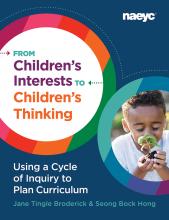From Children’s Interests to Children’s Thinking: Using a Cycle of Inquiry to Plan Curriculum

About the Book
-
Guiding you to observe and consider what children are thinking and wondering about
-
Detailing how to use documentation forms to record and revisit your observations, interpretations, questions, and plans
-
Providing strategies to support children’s inquiry and deepen thinking
-
Illustrating how to identify early learning standards met and make children’s learning visible
-
Following the process with real-life examples

Table of Contents
- Preface
-
Introduction: The Cycle of Inquiry Process
- Children as Inquirers
- Teachers as Researchers
- The COI System
- How to Use this Book
- Emergent Inquiry Examples
- Who this Book Is For
-
Chapter 1: Setting Up the Classroom for Emergent Inquiry
- Learning Centers
- The Daily Schedule
- Identifying an Inquiry Focus and a Core Group of Interested Participants
- For Further Reflection and Inquiry
-
Chapter 2: Facilitating Classroom Meetings and Routines
- Informal Classroom Meetings
- Focused Classroom Meetings to Enhance Inquiry
- Guidelines for Planning a Focused Classroom Meeting
- Planning a Focused Classroom Meeting: Castle Tower Example
- For Further Reflection and Inquiry
-
Chapter 3: Identifying Threads of Inquiry, Provocations, and Big Ideas
- Finding Threads of Inquiry
- Using Provocations
- Weaving the Threads of Inquiry
- Finding Big Ideas
- For Further Reflection and Inquiry
-
Chapter 4: Observing with Intention
- Observing to Interpret the Meaning in Children’s Play
- The Significance of Teachers’ Thinking to Emergent Curriculum Planning
- How Observation Informs Teacher Facilitation
- The COI Observation Record Form: What to Document
- Getting to Know the COI
- Observation Record Form
- Using the COI Observation Record Form: Learning from the Incinerator Project
- For Further Reflection and Inquiry
-
Chapter 5: Interpreting Children’s Thinking
- Teacher Interpretation: Teacher Thinking About Children’s Thinking
- A Focus on Thinking Leads to Conceptual Versus Thematic Curricular Design
- The COI Interpreting Thinking Form: What to Document
- Getting to Know the COI Interpreting Thinking Form
- Using the COI Interpreting Thinking Form: Learning from the Incinerator Project
- For Further Reflection and Inquiry
-
Chapter 6: Developing Curriculum Action Plans
- The Role of Divergent Thinking in Emergent Curriculum Planning
- Getting to Know the COI Curriculum Action Plan Form
- Using the COI Curriculum Action Plan Form: Learning from the Incinerator Project
- For Further Reflection and Inquiry
-
Chapter 7: Planning and Implementing a Provocation
- Thinking About Children’s Conversations and Representations when Planning Provocations
- Focusing to Keep Children Engaged in Intellectual Work
- Getting to Know the COI Inquiry Provocation Plan Form
- Using the COI Inquiry Provocation Plan Form: Clay Exploration Example
- Using the COI Inquiry Provocation Plan Form: Learning from the Incinerator Project
- Implementing Your Inquiry Provocation
- For Further Reflection and Inquiry
-
Chapter 8: Developing Reflective Evaluation
- Getting to Know the COI Reflective Evaluation Record Form
- Using the COI Reflective Evaluation Form: Learning from the Incinerator Project
- For Further Reflection and Inquiry
-
Chapter 9: Creating Documentation Panels
- Documentation Panel Making as Continuous Professional Development
- Large-Format Documentation Panels from the Incinerator Project
- Locating the Information on the COI forms to Include the Panels
- Small-Format Documentation Panel from a Classroom of 3- to 4-Year-Olds: Think White Project
- For Further Reflection and Inquiry
- Conclusion: Continuing the Cycle
-
Appendices
-
Appendix 1
- COI Observation Record Checklist
- Cycle of Inquiry Observation Record Form
-
Appendix 2
- COI Interpreting Thinking Checklist
- Cycle of Inquiry Interpreting Thinking Form
-
Appendix 3
- COI Curriculum Action Plan Checklist
- Cycle of Inquiry Curriculum Action Plan Form
-
Appendix 4
- COI Inquiry Provocation Plan Checklist
- Cycle of Inquiry Provocation Plan Form
-
Appendix 5
- COI Reflective Evaluation Checklist
- Cycle of Inquiry Reflective Evaluation Form
-
Appendix 1
- References
- Resources for Further Study
- Acknowledgments
- About the Authors
Book Details
ISBN: 978-1-938113-63-5
Publish Date: 2020
Related Resources
Online Articles
"The Command Center Project: Resolving My Tensions with Emergent Curriculum" - Follow Luvy Vanegas-Grimaud's self-study of the way her teaching practices support child-initiated projects. (Young Children, July 2017)
"Inspired by Reggio Emilia: Emergent Curriculum in Relationship-Driven Learning Environments" - In this article, Mary Ann Biermeier explores important elements of inquiry-based learning. (Young Children, November 2015)
Webinar
"Powerful Play: Enhancing Knowledge and Skill Development by Gently Guiding Play" - In this recorded webinar, Kathy Hirsh-Pasek and Shayna Cook share strategies for using guided play to boost children’s knowledge and skills.
Jane Tingle Broderick, EdD, is a professor of Early Childhood Education at East Tennessee State University, where she co-coordinates the Early Childhood PhD Program and the Early Childhood Education Emergent Inquiry Certificate Program. She has taught in early childhood for more than 20 years.

Seong Bock Hong, EdD, is a professor of Early Childhood Education at the University of Michigan–Dearborn, where she teaches graduate and undergraduate early childhood courses. She was the faculty director of the Early Childhood Education Center, a university lab school, from 2012 to 2017. She served as an interim director and documentarian at the Reggio-inspired Early Childhood Laboratory School during her doctoral studies at UMass, Amherst.

Reviews
The cycle of inquiry system has been a crucial resource in helping us transition from traditional curriculum to an emergent, inquiry-based model. Observing children and identifying action questions to plan project work helps us take the work deeper and allows us to connect the children’s thoughts and work in a meaningful way.
—Amber Foster, Lead Pre-K Teacher and Preschool Pedagogical Coach, Morning Star Child Development Center
Broderick and Hong flesh out the rigorous—and incredibly worthwhile—work that goes into inquiry-based teaching. They highlight the necessity of reflective practice and seeking the child's perspective. Educators who have previously felt discouraged by the complexity of this work, or their own uncertainties with it, will find understanding here.
—Jamie Solomon, Director, Scuola Creativa Preschool
Many thanks to these authors for offering a vision of the early childhood program as a research learning laboratory, a place where together, children and their teachers share the intellectual joy of active, meaningful inquiry and the co-construction of knowledge.
—Jeanne Goldhaber, Associate Professor Emerita of Early Childhood Education, University of Vermont
From Children’s Interests to Children’s Thinking captures the essential role of metacognition in supporting children as theory makers. This book will inspire educators to think critically about children’s play and self-initiated learning experiences, organize their own thinking, and place children at the front of each learning experience.
—Sonia Semana, Director, Child Development and Educational Studies Lab School, Fullerton College
This inspiring book reminds teachers about the magic of listening to children and interpreting their remarkable thinking. Everything you need to develop confidence in understanding the cycle of inquiry process for planning curriculum is beautifully explained and organized.
—Kim Ballantyne, Primary Teacher, Amherst School District
Continuing their work in making inquiry-based learning accessible to all educators, Broderick and Hong provide a clearly written approach to employ this educational method. Whether in my role as a school administrator or a college instructor, I will use this valuable resource with administrators, teachers, and college students.
—Meir Muller, Assistant Professor, University of South Carolina and Head of School, Cutler Jewish Day School
The authors describe clearly how the cycle of inquiry helps children construct knowledge. This constructivist approach to guiding curriculum from conversations to documentation to theories is well laid out and easy to follow.
—Sarah Neessen, Teacher, Knox County Head Start
This comprehensive guide to a Reggio-inspired approach and the cycle of inquiry process is laid out with utmost explicitness. Brilliantly complex, it is a must-have resource for all who are interested in exploring this holistic approach to children’s learning.
—Andrew Stremmel, Professor of Early Childhood Education, South Dakota State University
The cycle of inquiry delineated by Broderick and Hong challenges educators to move beyond the study of children’s interests to a deeper focus on their thinking, a crucial step in the co-constructive process of learning with and from children. This book offers a much-needed in-depth analysis of the complex, exciting processes of teacher research that inform strategies, thoughts, and actions that are respectful and supportive of the learning processes of children and adults.
—Brenda Fyfe, Dean and Professor Emeritus, School of Education, Webster University
